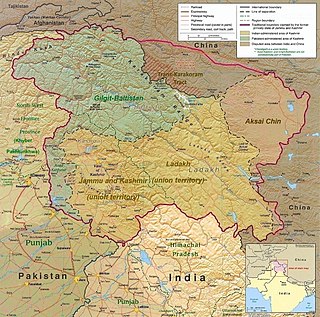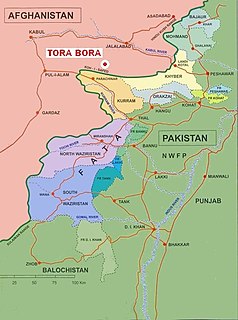 W
WMountain warfare refers to warfare in the mountains or similarly rough terrain. This type of warfare is also called Alpine warfare, after the Alps mountains. Mountain warfare is one of the most dangerous types of combat as it involves surviving not only combat with the enemy but also the extreme weather and dangerous terrain.
 W
WThe Battle of Wanna was a March 2004 military engagement between the Pakistan Army and members of Osama Bin Laden's al-Qaeda at Azam Warsak, near the South Waziristan town of Wanna. The army troops and intelligence paramilitary soldiers faced an estimated ~500 al-Qaeda foreign fighters holed up in several fortified settlements, the fighting ended with 17 soldiers dead.
 W
WThe Battle of the Caucasus is a name given to a series of Axis and Soviet operations in the Caucasus area on the Eastern Front of World War II. On 25 July 1942, German troops captured Rostov-on-Don, Russia, opening the Caucasus region of the southern Soviet Union, and the oil fields beyond at Maikop, Grozny, and ultimately Baku, to the Germans. Two days prior, Adolf Hitler issued a directive to launch such an operation into the Caucasus region, to be named Operation Edelweiß. German forces were compelled to withdraw from the area that winter as Operation Little Saturn threatened to cut them off.
 W
WThe Crossing of the Andes was one of the most important feats in the Argentine and Chilean wars of independence, in which a combined army of Argentine soldiers and Chilean exiles invaded Chile leading to Chile's liberation from Spanish rule. The crossing of the Andes was a major step in the strategy devised by José de San Martín to defeat the royalist forces at their stronghold of Lima, Viceroyalty of Perú, and secure the Spanish American independence movements.
 W
WThe insurgency in Khyber Pakhtunkhwa, also known as the War in North-West Pakistan, is an armed conflict involving Pakistan, and armed militant groups such as the Tehrik-i-Taliban Pakistan (TTP), Jundallah, Lashkar-e-Islam (LeI), TNSM, al-Qaeda, and their Central Asian allies such as the ISIL–Khorasan (ISIL), Islamic Movement of Uzbekistan, East Turkistan Movement, Emirate of Caucasus, and elements of organized crime.
 W
WThe Battle of Isurava took place over the period 26 to 31 August 1942. Forming part of the Kokoda Track campaign of the Second World War, the battle involved military forces from Australia, supported by the United States, fighting against Japanese troops from Major General Tomitaro Horii's South Seas Detachment who had landed around Buna and Gona in Papua mid-July 1942, with the intent of capturing Port Moresby to the south via the overland route.
 W
WThe Kashmir conflict is a territorial conflict over the Kashmir region, primarily between India and Pakistan, with China playing a third-party role. The conflict started after the partition of India in 1947 as both India and Pakistan claimed the entirety of the former princely state of Jammu and Kashmir with Pakistan recognizing Chinese sovereignty over the Trans-Karakoram Tract and Aksai Chin since 1963. It is a dispute over the region that escalated into three wars between India and Pakistan and several other armed skirmishes. India controls approximately 55% of the land area of the region that includes Jammu, the Kashmir Valley, most of Ladakh, the Siachen Glacier and 70% of its population, Pakistan controls approximately 30% of the land area that includes Azad Kashmir and Gilgit-Baltistan while China controls the remaining 15% of the land area that includes the Aksai Chin region, the mostly uninhabited Trans-Karakoram Tract, and part of the Demchok sector. After the partition of India and a rebellion in the western districts of the state, Pakistani tribal militias invaded Kashmir, leading the Hindu ruler of Jammu and Kashmir to join India and starting the Indo-Pakistani War of 1947 which ended with a UN-mediated ceasefire along a line that was eventually named the Line of Control. After further fighting in the Indo-Pakistani War of 1965 and the Indo-Pakistani War of 1971, the Simla Agreement formally established the Line of Control between the two nations' controlled territories. In 1999, armed conflict between India and Pakistan broke out again in the Kargil War over the Kargil district.
 W
WThe Second Battle of the Alps was a military campaign fought between combined German and Italian Social Republic forces, and the re-established French Republic led by Charles de Gaulle.
 W
WSki warfare is the use of ski-equipped troops in war.
 W
WThe Action of Tambo Nuevo, also known as Hazaña de los Tres Sargentos was a successful cavalry raid carried out between 23 and 25 October 1813, during the second Upper Peru campaign of the Argentine War of Independence, by a small detachment of Dragones of the Army of the North. The targets were the headquarters of royalist Colonel Saturnino Castro at Yocalla, and later a forward outpost on Tambo Nuevo.
 W
WThe Battle of Tora Bora was a military engagement that took place in the cave complex of Tora Bora, eastern Afghanistan, from December 6–17, 2001, during the opening stages of the United States invasion of Afghanistan. It was launched by the United States and its allies with the objective to capture or kill Osama bin Laden, the founder and leader of the militant organization al-Qaeda. al-Qaeda and bin Laden were suspected of being responsible for the September 11 attacks three months prior. Tora Bora is located in the White Mountains near the Khyber Pass. The U.S. stated that al-Qaeda had its headquarters there and that it was bin Laden's location at the time.